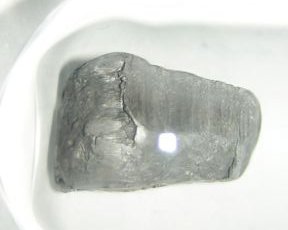 Named after the Greek word 'Thallos', Thallium is a soft, grey metal. It is a poor and malleable metal, soft enough to be cut with a knife at room temperature. Thallos means a green twig and thallium was named so for it's green spectral line. Thallium is highly toxic in nature and hence needs to handled with care. Thallium is very shiny though it dulls quickly in presence of oxygen. With the process of oxidation, thallium turns bluish grey and resembles lea. I order to prevent the oxidation of thallium which ends discoloring it, thallium has to be stored in mineral oils. Thallium is a toxic metal and should never come in contact with skin.
Named after the Greek word 'Thallos', Thallium is a soft, grey metal. It is a poor and malleable metal, soft enough to be cut with a knife at room temperature. Thallos means a green twig and thallium was named so for it's green spectral line. Thallium is highly toxic in nature and hence needs to handled with care. Thallium is very shiny though it dulls quickly in presence of oxygen. With the process of oxidation, thallium turns bluish grey and resembles lea. I order to prevent the oxidation of thallium which ends discoloring it, thallium has to be stored in mineral oils. Thallium is a toxic metal and should never come in contact with skin.Uses of Thallium
Thallium is mainly used in electronic industry. Out of 70% of it's annual global production is used up in electronic industry. Rest of it is used in pharmaceutical industry for the production of nuclear medicine and also by the glass industry. Thallium is also used for the treatment of ringworm and other skin infections despite of it's toxic nature. Thallium sulfate is effectively used as a rodent killer and an ant killer as it is odorless and tasteless.
No comments:
Post a Comment